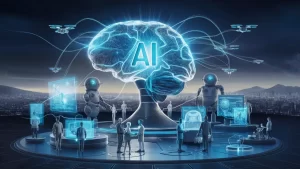Artificial intelligence is transforming how businesses interact with customers, ushering in a new era of efficient, personalized, and proactive customer service. Gone are the days of endless hold times or frustrating experiences with agents trying to decipher a customer’s needs. AI is now at the forefront, enabling companies to resolve issues faster, tailor interactions, and gather meaningful insights that improve service quality. This blog explores how AI-powered innovations are reshaping customer service from core operations to long-term strategies.
AI-Powered Chatbots
AI-powered chatbots are one of the most visible examples of how artificial intelligence is enhancing customer service. Capable of managing thousands of queries simultaneously, these intelligent tools are game-changers for businesses looking to offer 24/7 support without incurring massive human resource costs. Chatbots powered by AI understand natural language, allowing them to engage in meaningful, human-like conversations. They can assist customers in real-time, providing immediate answers to frequently asked questions and guiding users through processes like refunds or product recommendations.
What makes these chatbots so powerful is their adaptability and constant learning. With every interaction, machine learning algorithms improve their ability to comprehend customer queries and provide accurate responses. Amazon, for instance, uses AI-heavy chatbots to help customers find products, offering options based on browsing history and preferences.
The result of such innovation? Drastically reduced response times, improved customer satisfaction, and more efficient use of human agents for complex tasks.
Personalized Customer Experiences
One of the most valued elements of customer service is personalization, and AI excels at delivering this. By analyzing customer data, including previous interactions, purchase history, and browsing patterns, AI systems can create tailored recommendations and offers. Personalized customer experiences do more than just respond to inquiries; they anticipate needs, making the experience feel almost intuitive.
For example, Netflix exemplifies the power of personalization with its AI algorithms that suggest shows or movies a user is likely to enjoy based on prior behavior. Businesses have embraced such personalization across industries, understanding that customers prefer companies that “know” them.
This level of customization fosters loyalty and satisfaction, as customers feel companies are paying attention to their unique needs. From suggesting relevant products to addressing specific issues, AI ensures that every interaction is meaningful, building long-term relationships between brands and their customers.
Predictive Customer Service
Preventing issues before they even arise is now possible, thanks to AI. This is the concept of predictive customer service, a proactive approach that elevates the customer experience. AI analyzes historical data and trends to predict potential problems, allowing businesses to address them in advance.
Take, for example, a telecommunications company using AI to identify when a customer’s internet connection might fail based on usage patterns. With this information, the company can notify the customer in advance, offer troubleshooting solutions, or even fix the problem before the user notices.
Predictive service capability also applies to flagging potential dissatisfaction. By analyzing sentiment and behavior, AI tools can pinpoint customers likely to churn and intervene with personalized offers or solutions. This not only prevents customer loss but also highlights efforts to retain and care for valued customers.
AI-Driven Agent Assistance
While some fear that AI may eventually replace human customer service agents, the technology actually complements and enhances agent performance. AI-driven tools provide agents with valuable assistance, equipping them with information in real time so they can best serve the customer.
Virtual assistants and knowledge bases powered by AI can instantly retrieve relevant details or solutions, reducing the time an agent spends searching for answers. For instance, a customer service agent dealing with a faulty return request could use AI’s insights to quickly identify the issue and offer a satisfactory resolution without delay.
Additionally, AI tools can provide real-time suggestions during customer interactions, identifying upsell opportunities or phrases likely to diffuse tense situations. Salesforce’s Einstein AI platform is a great example, delivering insights to agents so they can take informed and effective action, ultimately driving better resolutions.
Sentiment Analysis
Understanding how customers feel during interactions is crucial for refining service quality, and AI has greatly advanced this aspect of customer service through sentiment analysis. By analyzing tone, vocabulary, and phrasing in texts, emails, or spoken conversations, AI tools can detect emotions like frustration, satisfaction, or confusion.
Sentiment analysis plays a pivotal role in improving support experiences. For example, if an AI system recognizes that a customer is particularly upset, it can automatically escalate the ticket to a human agent trained to handle such situations. This ensures that customers in distress receive empathetic and immediate attention, rather than being left to deal with automated messages.
Beyond individual interactions, sentiment trends on a wider scale can help businesses address systemic issues. For instance, if a significant proportion of customers express dissatisfaction after a product launch, AI can flag this for the business to address in future iterations or updates.
The Future of AI in Customer Service
The trajectory of AI in customer service indicates a future with even smarter technologies and deeper personalization. Advancements such as voice recognition, emotion predictors, and seamless human-AI collaboration promise experiences that feel entirely organic. Virtual customer assistants will likely become even more human-like in conversation, blurring the boundaries between AI and genuine human experience.
Automation will not only simplify repetitive tasks but also extend to predictive interactions that mimic human understanding. Furthermore, AI will empower businesses to address larger audiences while retaining personalization, truly transforming customer relationships at scale. For industries reliant on customer loyalty, such as retail and hospitality, staying ahead in AI adoption will be essential.
Building a Customer-Centric Future with AI
AI is undeniably revolutionizing customer service, paving the way for faster, more efficient, and personalized interactions. Through applications such as AI chatbots, sentiment analysis, and predictive service capabilities, businesses can not only meet customer expectations but exceed them in ways once thought impossible.
For companies looking to become leaders in customer service, integrating AI is no longer optional. Begin exploring the world of AI tools to reimagine how your organization connects with its customers and stays competitive.
FAQs
1. Will AI replace human agents in customer service?
No, AI is designed to augment human agents, not replace them. AI handles repetitive tasks, allowing agents to focus on more complex and emotional interactions.
2. How secure is customer data when using AI tools?
Most reputable AI technologies prioritize customer data security, employing stringent encryption and compliance protocols. Businesses should always verify any AI provider’s policies.
3. Which industries benefit most from AI in customer service?
AI benefits all industries, but retail, finance, healthcare, and telecommunications often see the most significant gains due to their high volume of customer interactions.
4. Can small businesses afford AI for customer service?
Yes, there are scalable AI tools and platforms tailored to small- and medium-sized businesses, offering affordable plans and easy integration.
5. What do I need to implement AI in customer service?
You will need access to good-quality data, reliable AI software, and a team trained to use the technology effectively. Start small, and scale as your business grows.




